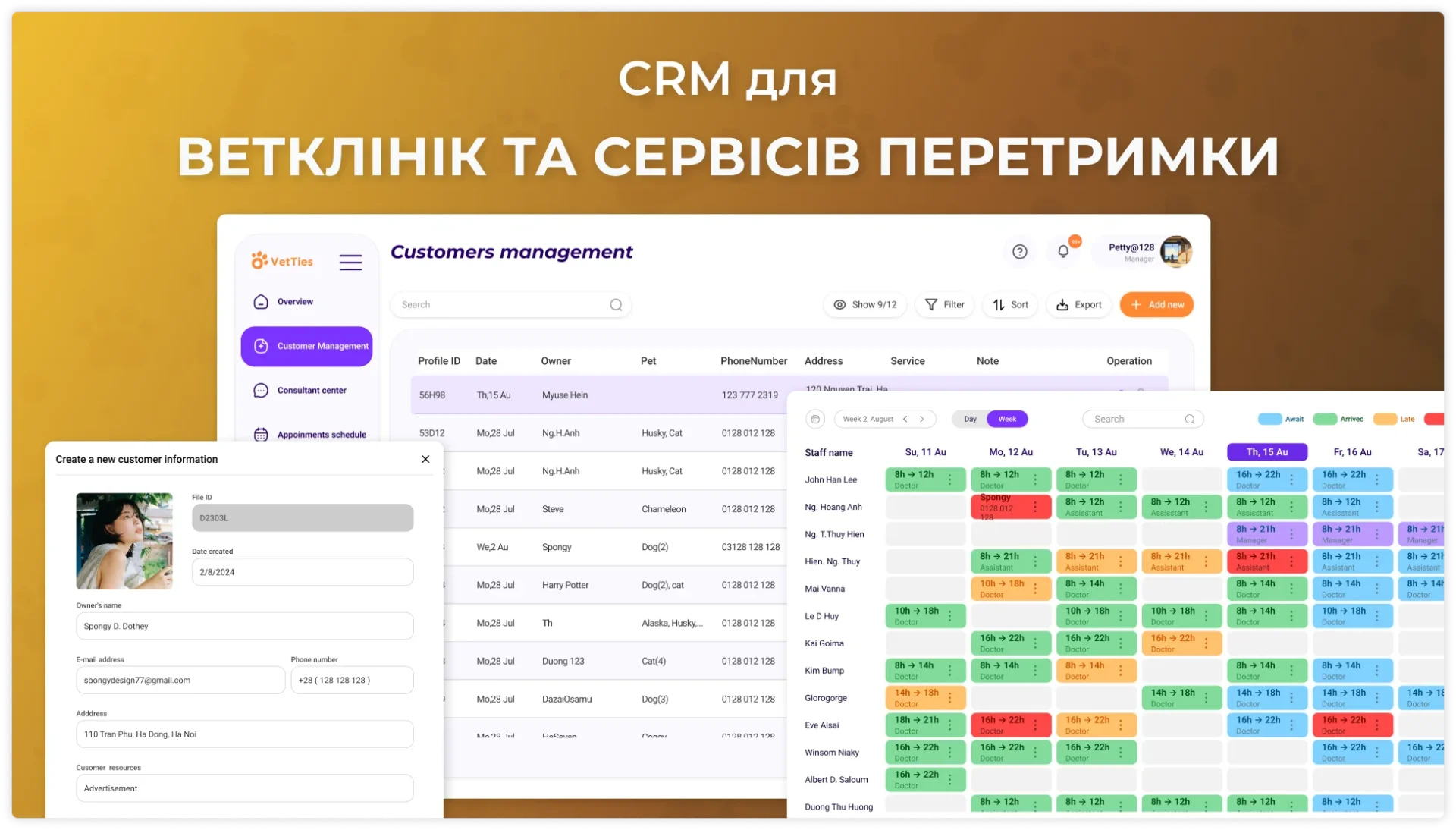
A veterinary clinic is a place where love for animals is combined with high professionalism. But this is not enough – success in the veterinary business is determined not only by the quality of treatment, but also by service, marketing, personnel management, medicines, documents. All this requires 24/7 attention, so managing a modern veterinary clinic without digital tools is like treating a patient without a diagnosis. Queues, mixed up cards, lost appointments, forgotten appointments – all this not only reduces the level of service, but also slows down business development.
A custom CRM program for veterinary clinics in Ukraine and foreign countries, developed by the AVADA MEDIA team, will manage your business processes with surgeon’s precision. Forget about routine, paper journals and lost customers – the system will work for the health of your furry, feathered and scaly patients and the prosperity of your business. We do not offer template solutions, but individually develop your own unique CRM for your veterinary business, tailored to the specifics of your activity. So that every visit, every operation, and every dose of vaccine is taken into account, and the client remains satisfied and returns again.
Veterinary CRM is a custom software that allows you to automate many routine tasks – making appointments, maintaining medical records, reminding you about vaccinations and scheduled check-ups, invoicing and tracking payments. But most importantly, a veterinary clinic program helps you better understand your customers, and as a result – increase the profitability of your business.
Veterinary clinic CRM is not just a database, but a single digital space where you can find:
The program for veterinary clinics allows you to avoid paperwork and manage your veterinary clinic not manually, but through a convenient interface – from any device, from any place. This is your indispensable assistant who does not get tired, does not go on vacation and does not make mistakes.
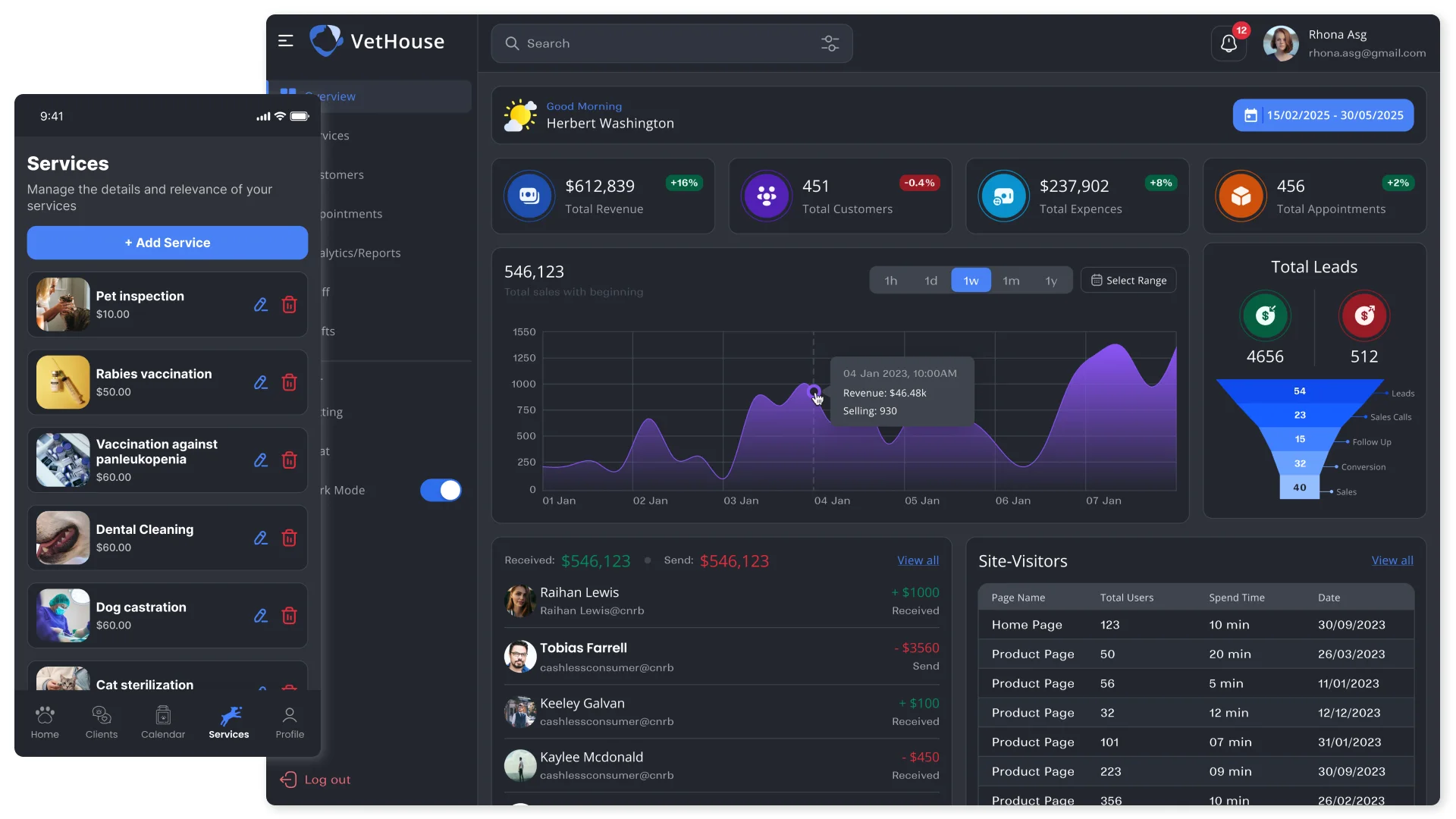
Managing a veterinary clinic is not only a love for animals, but also a complex business process that has its own unique features, risks and difficulties.
Veterinarians need to keep a detailed medical history of each pet, take into account the characteristics of the breed, allergies, procedures performed, appointments and much more. Manually maintaining such records is fraught with errors and loss of important information. Software for veterinary clinics makes it possible to structure all data in electronic form, providing quick and convenient access to them at any time.
The flow of patients in a veterinary clinic is often unpredictable. Therefore, it is important to strictly plan the working hours of doctors, avoid overlaps, double appointments, “windows” in the schedule, prevent lack of time for procedures and promptly respond to emergencies. CRM for a veterinarian helps optimize the appointment schedule, keeps records of patients, warns of overload and downtime. The system can be implemented with convenient tools for online booking, automatic scheduling and sending clients reminders about visits.
Pet owners are very sensitive to their pets and appreciate an individual approach. The program for a veterinary clinic allows you to collect information about customers’ preferences, the history of their requests and use this data to build trusting and long-term relationships. For example, you can send personalized birthday greetings to your pet or reminders about the opportunity to purchase food of a certain brand.
Controlling income and expenses, invoicing, and tracking payments are important components of any business. A CRM management system for a veterinary clinic automates these processes, minimizes the risk of errors and provides a transparent picture of the clinic’s financial status. You will always be aware of which clients have debts, which services are in greatest demand and how to optimize pricing policy.
Maintaining contact with pet owners is the key to their loyalty and trust. CRM for veterinary business makes it possible to organize effective communication through various channels: SMS-mailings with reminders about visits, email-mailings with useful information and promotions, integration with messengers for operational support, storing information about each visit, procedure, appointment, collecting feedback.
In conditions of growing competition, it is important to attract new customers and retain existing ones. CRM-system for veterinary medicine provides tools for segmenting the customer base, conducting marketing campaigns and assessing their effectiveness. You will be able to accurately target your offers and attract exactly those who need your services.
In a large veterinary clinic, it is important to effectively coordinate the work of doctors, assistants and administrators. CRM-system for veterinary clinics can include modules for accounting of working hours, calculating salaries and controlling the performance of tasks.
Veterinarians don’t just treat – they consult, prepare documents, and keep patient histories. CRM programs for veterinary clinics take the routine off their shoulders: they automatically create charts, generate documents, store images, analyzes, and conclusions.
Wherever there is a warehouse, there will always be shortages, surpluses, and delays. CRM for veterinarians integrates with the warehouse accounting system, controls the movement of goods, automatically writes off medications after procedures, and records expenses.
An automated veterinary clinic management system collects data and turns it into reports that help you make management decisions based on numbers, not intuition. At any time, you can find out which services are the most profitable, when to expect peak load, how many clients are returning, which doctors are more busy than others, etc.
Sometimes personal data of clients (name, phone number, information about the pet) is sent via regular e-mail and messengers without encryption. In addition, veterinary clinic employees can use one account or access to shared files. And without a specialized system, it is impossible to track who made changes to the data and when. All this increases the risk of unauthorized viewing, leakage or even intentional deletion of data.
In CRM, you can protect personal data of clients and medical information of pets using modern encryption technologies, multi-level authentication, separation of access rights and regular backups. This minimizes the risk of leakage, data loss or unauthorized access.
CRM system for a veterinary clinic
Veterinary business is multifaceted. It intertwines medicine, customer service, retail sales (medicines, food, accessories) and even hotel services for pets. Grooming, chipping, pet hotels and shelters – each type of service involves its own processes, tasks and risks. A CRM system for a veterinary clinic should not be universal for everyone, but adapted to each direction.
For veterinary hospitals, the key needs are accurate medical data recording, effective record management and high-quality interaction with animal owners. Therefore, CRM for veterinary clinics should primarily include the following functions:
How it works: the cat owner receives an SMS reminder about the annual vaccination, follows the link, registers in online format for a convenient time and pays for the service. Payment is recorded in the CRM, the necessary drugs are reserved automatically.
Automation of an animal shelter should primarily ensure booking places in a pet hotel, taking into account the peculiarities of keeping each pet and convenient communication with its owners. Therefore, the following functions are implemented in pet hotel management programs:
Thus, if you have a CRM for pet hotels, then during the booking process the administrator will see that the dog does not have a rabies vaccination and will offer to sign up for vaccination before registering it at the pet hotel.
Shelters, shelters and temporary animal housing centers are a complex area, often with a volunteer basis. Automation of the animal shelter service should provide:
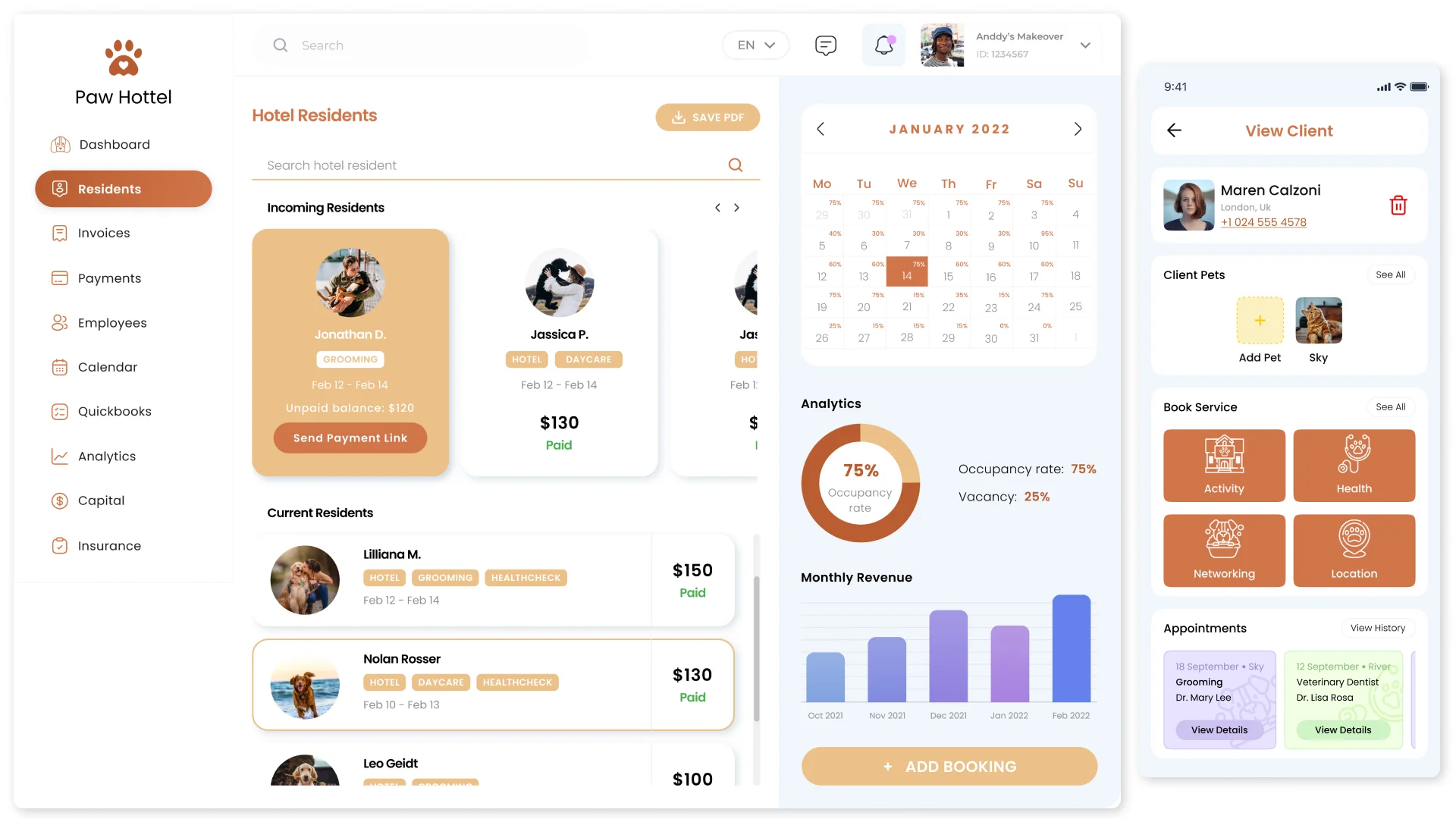
For grooming salons, the order in recording clients, accounting for preferences in haircuts and care, as well as management of consumables are important. Therefore, CRM systems for grooming salons usually implement the following functions:
Many veterinary clinics combine medical and commercial functions. The program for a veterinary pharmacy takes on key tasks:
Veterinary clinic automation becomes a necessity when standard management methods no longer cope with the volume of tasks and begin to slow down development. Here are the key signs that it is time for your clinic to switch to a CRM system:
If you catch yourself thinking that routine tasks eat up time, and management decisions have to be made blindly – then the time has come to implement CRM in your veterinary clinic.
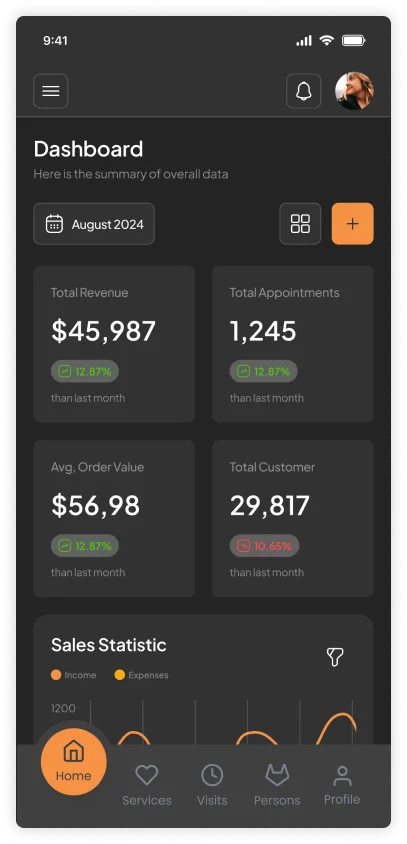
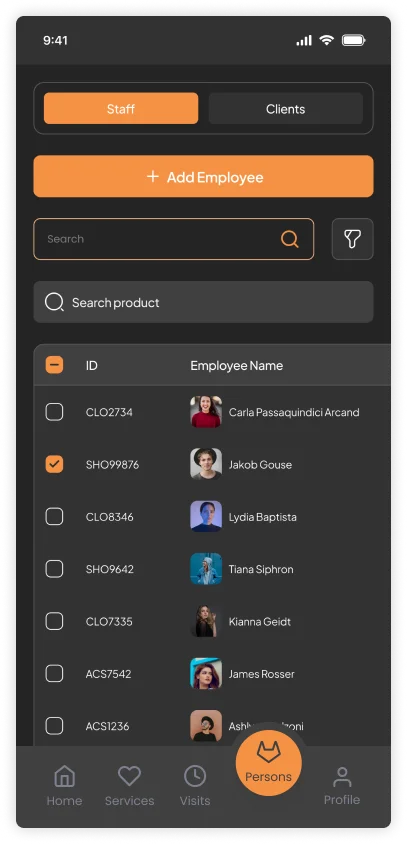
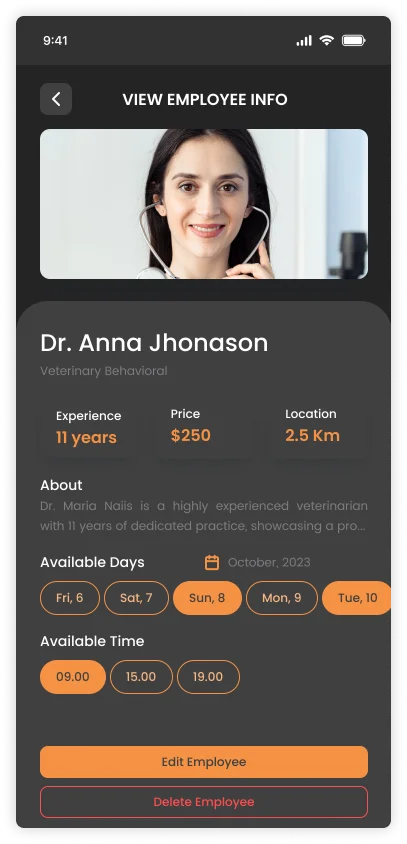
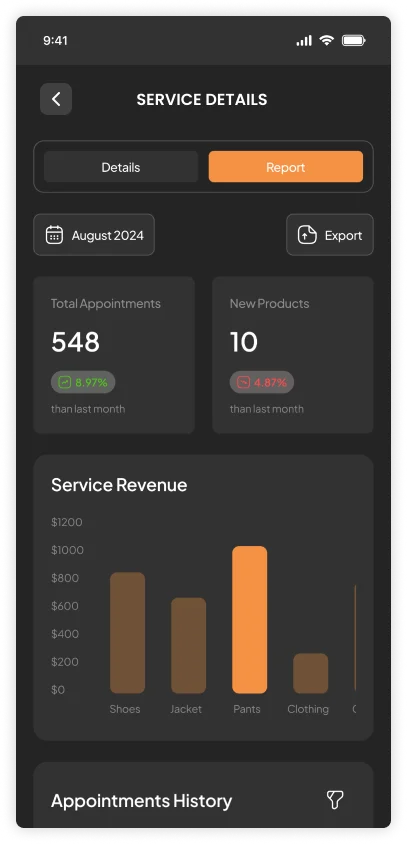
Mobile version of CRM
Developing a program for a veterinary clinic is a consistent construction of an individual ecosystem that will be organically woven into business processes. This approach requires phased, in-depth work, where each step serves as the foundation for the next.
At the initial stage, analysts delve into the specifics of your work, study existing processes – patient registration, medical documentation, methods of interaction with clients, financial accounting. To do this, they conduct interviews with key employees, analyze current systems (if any), identify weaknesses and inefficiencies, and also determine the strategic goals and expectations of the customer from the future CRM system for the veterinary business.
Based on the analysis, a detailed technical task is developed – a kind of project roadmap. The TOR contains a detailed description of the functional and non-functional requirements for CRM for a veterinary clinic, its architecture and integrations with other services (e.g., telephony, online calendars), as well as requirements for data security and performance. This document serves as the basis for all further development.
At the design stage, architects develop the logical structure of the future CRM system for a veterinary clinic, determine the interaction between various modules and databases. In parallel, UX designers create interactive prototypes of interfaces using Moqups, Figma, Adobe XD, which allow testing the system before development begins and agreeing it with the customer.
At this stage, prototypes are made visually attractive and intuitive. It is important to find a balance between a professional medical environment and a friendly, understandable interface. UX/UI designers create a stylish and ergonomic interface, taking into account the corporate identity of your clinic and usability. In the process, they also create guidelines – uniform standards for all screens, so that the interface is holistic and easy to perceive. Particular attention is paid to ease of navigation, logical arrangement of elements and accessibility of information, adaptability for different devices (laptop, tablet, smartphone), so that working with the system is as comfortable and efficient as possible for each employee in any conditions.
A key stage at which programmers translate approved mockups and technical specifications into clean, optimized program code. Front-end developers are responsible for creating a user interface with which employees interact (web pages, forms, tables, etc.). For this, modern web technologies are used – HTML, CSS, JavaScript, as well as popular frameworks and libraries – React, Angular, Vue.js, which ensure high speed and adaptability of the interface.
Backend developers create the server part of the system, which is responsible for data processing, application logic, interaction with databases and integration with other services. For backend development, reliable and scalable programming languages Python, Java, Node.js and PostgreSQL, MySQL, MongoDB databases are used. Development is carried out according to flexible Scrum and Agile methodologies, sprints with demonstration of intermediate results.
Before release, an individual program for managing a veterinary clinic undergoes comprehensive multi-level testing. A team of QA engineers checks its functionality and compliance with the requirements of the technical specifications, evaluates usability, performance under high loads, tests security and integrations. Manual methods and automatic tools such as Selenium, JUnit, PyTest are used for testing.
After successful completion of all testing stages, the CRM system is placed on production servers, the environment is configured, data is transferred from existing systems and employees are trained to work with the new program. It is important to ensure a smooth transition to the new system, providing comprehensive support at the initial stage of operation.
After the release, the project does not end – the management system for a veterinary clinic requires regular support: updates, fixes, adaptations to changing tasks. Project support under SLA involves regular backups, monitoring of performance, and bug fixes. It is also possible to refine the system as the business grows: adding new functions, integrations, and modules. This approach allows CRM to evolve together with the veterinary clinic, adapting to new realities.
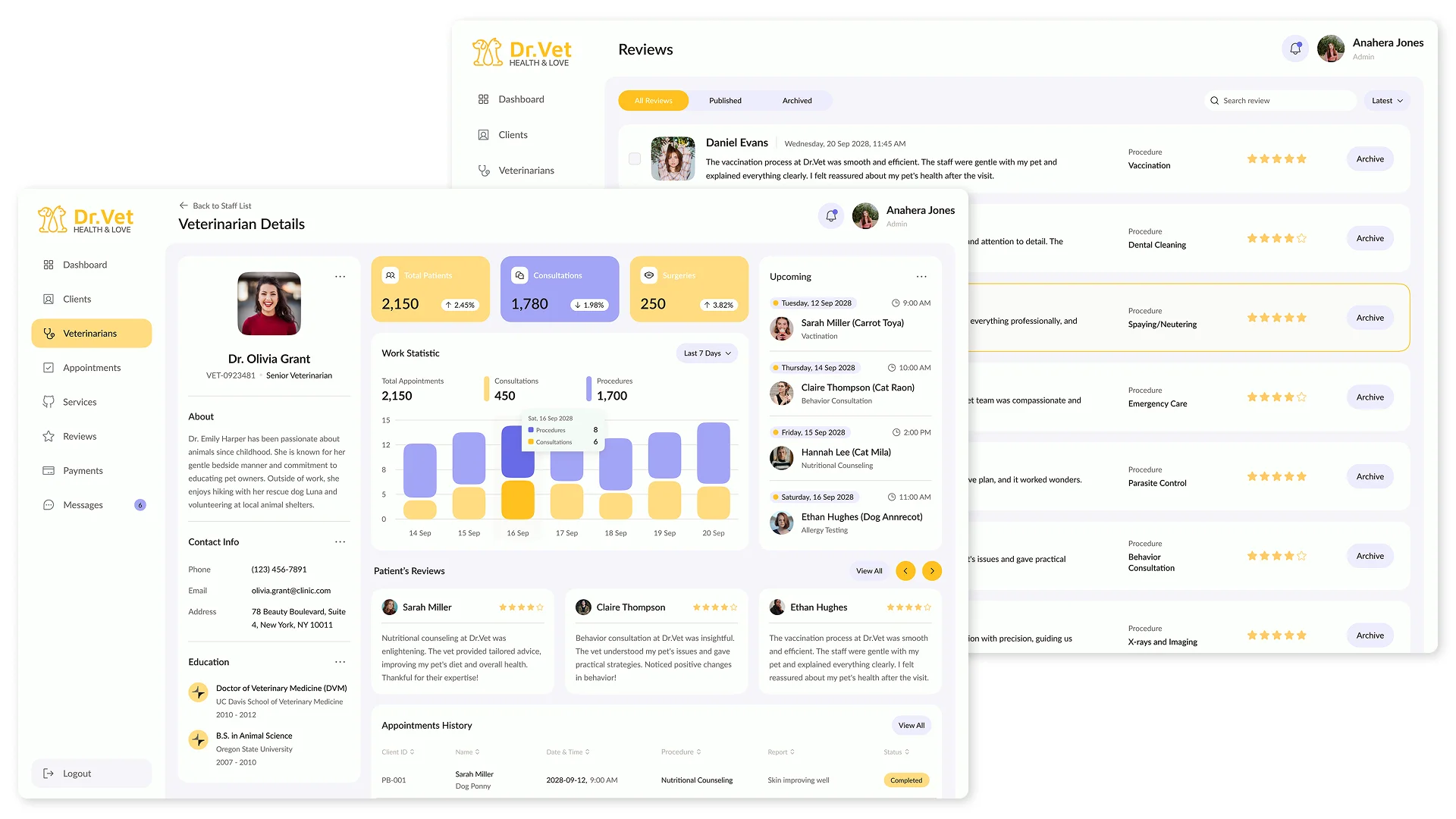
Many veterinary clinics strive to adapt standard CRMs for medicine or trade to their specifics. But the veterinary business is a special area where patients are unable to speak, which stories are stored for years. Therefore, we develop individual CRM programs for veterinarians on a turnkey basis, based on their needs, processes, and scale.
We take into account everything:
Your own CRM system for veterinary clinics will grow with you: it will add branches, new directions, a hotel for animals, a pet store – all this without global changes to the system.
We offer a comprehensive approach: from the development of individual solutions, fully adapted to the specifics of your business, to customization and refinement of existing software products. You can also start with basic modules and gradually expand the functionality along with the development of the clinic. Our approach and many years of experience in creating management systems allow you to choose the optimal way to automate your veterinary business. Our specialists will develop a CRM system that really works: reduces routine, speeds up customer service, helps manage resources and stimulates the growth of your business.
Is it possible to integrate CRM with the clinic website so that customer requests are automatically entered into the system?
It is possible to integrate the system with your website and online registration forms so that all requests left by customers are automatically entered into the database without the intervention of an administrator. This will speed up the processing of requests, reduce the likelihood of errors and prevent the loss of any request. You can also configure automatic classification of requests for services or specialists.
Does CRM for veterinary clinics support work with multiple branches?
CRM allows you to centrally manage a network of veterinary clinics or multiple branches of one veterinary clinic. At the same time, the system allows you to differentiate employee access by location, roles and authorities so that everyone sees only their part of the data.
Can veterinarians use the veterinary clinic program on a tablet or smartphone?
CRM is adapted for mobile devices so that doctors can enter data on examinations, diagnoses and appointments directly on a tablet or smartphone. This is especially convenient when working in treatment rooms or on field visits. The mobile interface will synchronize with the main database in real time, saving the complete patient history.
Can CRM be used to record video and audio notes for patients?
The veterinary CRM program is ideal for recording and storing video or audio notes that will be attached to the patient’s card. This can be useful for monitoring the progress of treatment, visual dynamics of recovery, or explaining complex cases to colleagues. All multimedia files will be available only to authorized employees, taking into account data confidentiality.
Does the system support document signing?
Yes, in CRM for veterinarians, an electronic signature module can be implemented so that pet owners can sign contracts, consents for treatment, and other legal documents directly on a tablet in the clinic or remotely via email. All signed files will be automatically saved in CRM and attached to the client’s profile.
Can personal recommendations be created for pet owners?
The program for veterinary clinics can be supplemented with a recommendation module that will generate individual advice on care, nutrition, and disease prevention based on the history of visits and data about the pet.
Is it possible to record customer feedback and manage the reputation of the clinic in CRM?
A module can be developed to collect and analyze customer feedback. The system will allow you to track the level of satisfaction, generate feedback reports, and integrate with external platforms to automatically collect ratings. You will be able to respond faster to criticism, strengthen the strengths of the service, and manage your online reputation.
Can the program be integrated with video surveillance systems to monitor the interaction between employees and customers?
The veterinary management system can be integrated with video surveillance systems and link events in the program – for example, a client visit, an animal’s exposure, a doctor’s appointment with video fragments. This will help increase security, control service processes, and resolve disputes. It`s also possible to configure visit reports with a link to video recording.
Can CRM be used to record animals that are inpatient or in a shelter?
The system can keep track of animals that are in a hospital or hotel, including feeding schedules, treatment appointments, daily reports and observations, as well as the length of stay, costs of medications and services for each pet.
In what format are reports provided and what indicators are displayed in them?
Software for veterinary clinics supports automatic generation of management and financial reports based on specified metrics: attendance, revenue, workload of specialists, popularity of services and much more. Reports can be generated in the form of tables, graphs and visual dashboards for visual analysis.
Our works
Contact the experts Have a question?
Developed by AVADA-MEDIA™
The user, filling out an application on the website https://avada-media.ua/ (hereinafter referred to as the Site), agrees to the terms of this Consent for the processing of personal data (hereinafter referred to as the Consent) in accordance with the Law of Ukraine “On the collection of personal data”. Acceptance of the offer of the Consent is the sending of an application from the Site or an order from the Operator by telephone of the Site.
The user gives his consent to the processing of his personal data with the following conditions:
1. This Consent is given to the processing of personal data both without and using automation tools.
2. Consent applies to the following information: name, phone, email.
3. Consent to the processing of personal data is given in order to provide the User with an answer to the application, further conclude and fulfill obligations under the contracts, provide customer support, inform about services that, in the opinion of the Operator, may be of interest to the User, conduct surveys and market research.
4. The User grants the Operator the right to carry out the following actions (operations) with personal data: collection, recording, systematization, accumulation, storage, clarification (updating, changing), use, depersonalization, blocking, deletion and destruction, transfer to third parties, with the consent of the subject of personal data and compliance with measures to protect personal data from unauthorized access.
5. Personal data is processed by the Operator until all necessary procedures are completed. Also, processing can be stopped at the request of the User by e-mail: info@avada-media.com.ua
6. The User confirms that by giving Consent, he acts freely, by his will and in his interest.
7. This Consent is valid indefinitely until the termination of the processing of personal data for the reasons specified in clause 5 of this document.
Send CV
Contact us in any convenient way for you:
+ 38 (097) 036 29 32